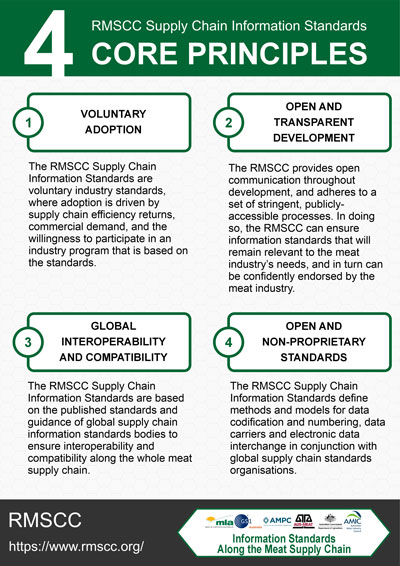RMSCC Supply Chain Information Standards Core Principles

1. Voluntary Adoption
The RMSCC Supply Chain Information Standards are voluntary, industry standards where adoption is driven by supply chain efficiency returns, commercial demand and the willingness to participate in an industry program that is based on the standards.
2. Adherence to an open and transparent standards development model
The RMSCC standards development model is open and transparent to ensure both relevance to the needs of meat industry as well as endorsement by the meat industry. The RMSCC standards development model comprises the following steps:
- Initiate - Industry request new or update to standards.
Requests are evaluated by the RMSC Committee to determine if either; i) an existing standard can be updated to address the required, ii) a new standard is required, iii) an implementation guide is required to explain how to use an existing standard to satisfy the request, or iv) the request is referred back to the originator for more information. - Develop - Call for subject matter experts for working group.
If an update to a standard or a new standard is required, then the RMSC Committee will define the scope of the work and call for subject matter experts to form a Working Group. The Working Group prepares a draft for comment, or goes back to the RMSC Committee for clarification, scope change or rejection of request if it cannot be addressed. - Review - Draft standards circulate to industry for comment.
The RMSC Committee circulates the draft standard to their respective industry members for review and feedback. The Working Group uses the feedback to update the draft and returns it back to the RMSC Committee for additional feedback or approval. - Approve - Industry signs off on draft standard.
Once feedback from industry has been satisfactorily addressed, the draft standard is circulated through the RMSC Committee to their respective industry members for voting for industry sign off of the draft standard. - Endorse - Standard submitted to AMILSC for endorsement.
Industry signed-off and approved standards are presented to the AMILSC for formal endorsement. Once the endorsement has occurred, the standard is published as industry-endorsed.
3. Interoperability and compatibility through cooperation with global supply chain information standards bodies
The RMSCC Supply Chain Information Standards are based on the published standards and guidance of global supply chain information standards bodies to ensure interoperability and compatibility along the whole meat supply chain.
RMSCC cooperation includes work with:
- GS1
- AUS-MEAT
- AMILSC
- UN/CEFACT
- World Customer Organization
- Global Legal Entity Identifier Foundation
- International Organization for Standardization
- Digital Container Shipping Association
4. Open and non-proprietary standards
The RMSCC Supply Chain Information Standards define methods and models for data codification and numbering, data carriers and electronic data interchange in conjunction with global supply chain standards organisations.
The RMSCC supply chain information standards are open and non-proprietary in nature. Commercial organisations may develop commercial offering that utilise the RMSCC Supply Chain Information Standards, however the standards remain open and non-proprietary. This approach ensures the highest likelihood for interoperability between systems, as the method for interchange and data exchange are based on common supply chain standards.